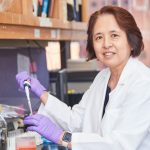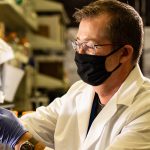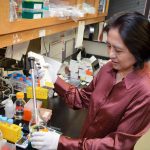Xiao-Hong Sun, Ph.D.
Professor
Arthritis & Clinical Immunology Research Program
Lew and Myra Ward Chair in Biomedical Research
Adjunct Professor, Departments of Microbiology & Immunology and Cell Biology, University of Oklahoma Health Sciences Center
My 101
My lab is focused on a specific family of proteins called E proteins, which are decision makers that control genetic information and decide what kinds of cells are made.
We want to understand how these lineage decisions are made and what the implications of these decisions are in human health.
We know that E proteins are important for making B cells and T cells, which are two types of immune cells, but how this process works is poorly understood.
We are investigating how this complex process works by studying mice who do not have E proteins. We specifically looked at the thymus, a small organ that sits at the top of the chest and exists specifically to train the immune system to recognize what is normal and what is not.
When E proteins were removed from the thymus, we discovered the organ made an entirely different kind of cells in their place: innate lymphoid cells. Innate lymphoid cells trigger an immediate immune response and respond to tissue damage or infections very quickly but are less sophisticated in immunity than B or T cells.
We were the first to show the thymus can make these cells, and we are investigating the biological significance to understand why the thymus has this function and how it contributes to health in mice and, ultimately, in humans.
This has important potential for drug development because innate lymphoid cells, while they do some good things, have been implicated in a number of diseases, including asthma, inflammatory bowel disease and psoriasis.
Research
Hematopoiesis is a developmental process where hematopoietic stem cells differentiate into different cell types through a series of lineage decisions, which are largely orchestrated by precise transcriptional programs. The basic helix-loop-helix family of transcriptional regulators includes E proteins encoded by the E2A, HEB and E2-2 genes and their inhibitors called Id proteins (Id1-4). Id proteins dimerize with E proteins and inhibit the DNA binding activity of E proteins. Therefore, the net E protein activity in a cell is determined by the concentration of both E and Id proteins. Work from our laboratory and others have shown that these proteins play important roles in several steps in hematopoiesis. E proteins are indispensable for the development of B and T lymphoid cells whereas Id proteins favor myeloid differentiation. These proteins have also been shown to be important for the maintenance of hematopoietic stem cells.
Recently, we have found that E proteins play crucial roles in suppressing the innate lymphoid fates while ensuring the robust production of B and T cells. Innate lymphoid cells are newly discovered classes of immune cells implicated in a variety of ailments such as asthma and inflammatory bowel diseases. We are interested in understanding how alternations in E protein function regulates the production of these cells, thus affecting the disease activities. The animal models we have collected over the years also offer us excellent opportunities to study the impact of these cells on immunity as well as tumor microenvironments.
Brief CV
Education
Ph.D., Cornell University, Ithaca, New York, 1987
Honors and Awards
Cancer Research Institute Postdoctoral Fellowship, 1989-1991
Cancer Research Institute Investigator Award, 1992-1996
Irma T. Hirschl Trust Career Scientist Award, 1994-1998
S. Graham Smith Distinguished Scientist Award, 2002-2005
Elected Fellow of the American Association for the Advancement of Science, 2012
J.Donald and Patricia H. Capra Award for Scientific Achievement, 2014
Other Activities
Reviewer for Immunity, Nature Genetics and Nature Immunology
Member of Scientific Advisory Committee of the Damon Runyon Cancer Research Foundation
Member of the NIH CMI-A and CMI-B study section
Memberships
American Association for the Advancement of Science
American Association of Immunologists
Society of Chinese Bioscientists in America
Joined OMRF scientific staff in 1999
Publications
Recent Publications
Hoover AR, Liu K, Furrer C, Lam SSK, Anderson DW, Zhou Z, Yang J, Wong CF, Medcalf AD, Sun XH, Hode T, Alleruzzo L, Delawder A, Raker J, Abousleiman G, Valerio TI, Sun Y, Papin JF, Li M, Chen WR. N-Dihydrogalactochitosan Drives Conventional and Alternative Activations of STING to Synergize Type I IFN and IL-1β Productions for Antitumor Immunity. Adv Funct Mater 34, 2024 December, PMID: 39896882, PMCID: PMC11784597
Sok SPM, Pipkin K, Popescu NI, Reidy M, Li B, Van Remmen H, Kinter M, Sun XH, Fan Z, Zhao M. Gpx4 Regulates Invariant NKT Cell Homeostasis and Function by Preventing Lipid Peroxidation and Ferroptosis. J Immunol, 2024 August, PMID: 39158281, PMCID: PMC11408103
Yu S, Zhang J, Liu C, Sun X, Pang X, Li Y, Sun X, Jin R, Zhang Y. Inhibition of E protein activity facilitates the quiescence exit of naïve CD4(+) T cells through modulating PI3K-AKT signaling and TCR microcluster formation. Cell Immunol 351:104065, 2020 May, PMID: 32089259
Selected Publications
Bajana S, Pankow A, Liu K, Michniowska M, Urban JF Jr, Chen WR, Sun XH. Correlation between circulating innate lymphoid cell precursors and thymic function. iScience. 2022 Feb 18;25(2):103732. doi: 10.1016/j.isci.2022.103732. eCollection 2022 Feb 18. PubMed PMID: 35118353; PubMed Central PMCID: PMC8792071.
Srinivasan A, Bajana S, Pankow A, Yuen C, Shah RK, Sun XH. Type 2 innate lymphoid cells from Id1 transgenic mice alleviate skin manifestations of graft-versus-host disease. BMC Immunol. 2021 Jul 13;22(1):46. doi: 10.1186/s12865-021-00432-w. PubMed PMID: 34256699; PubMed Central PMCID: PMC8278660.
Bajana, S, Thomas, K, Georgescu, C, Zhao, Y, Wren, JD, Kovats, S, and Sun, XH Augmenting E Protein Activity Impairs cDC2 Differentiation at the Pre-cDC Stage. 2020 Front Immunol. 11:577718.PMID: 33391258, PMCID: PMC7775562
Peng V*, Georgescu C*, Bakowska A, Pankow A, Qian L, Wren JD, Sun XH. E proteins orchestrate dynamic transcriptional cascades implicated in the suppression of the differentiation of group 2 innate lymphoid cells. 2020 J Biol Chem. 295(44):14866-14877. PMID: 32817168, PMCID: PMC7606671 (available on 2021-10-30)
Qian, L., Bajana, S., Georgescu, C., Peng, V., Adriano, I., Wang, H.-C., Alberola-Ila, J., Colonna, M., Wren J. D. and Sun, X.-H. Suppression of ILC2 differentiation from committed T cell precursors by E protein transcription factors. 2019 J. Exp. Med. 216(4):884-899. PMID: 30898894, PMCID: PMC6446881
Wang, H.C.,* Qian, L.,* Zhao, Y., Mengarreli, J., Adrianto, I., Montgomery, C. G., Urban, Jr., J. F., Fung, K.-M., Sun, X.-H. Down-regulation of E protein activity augments an ILC2 differentiation program in the thymus (2017) J. Immunol. 198:3149-3156. PMID: 28258196, PMCID: PMC5404348
Contact
Immunobiology and Cancer Research Program, MS 29
Oklahoma Medical Research Foundation
825 N.E. 13th Street
Oklahoma City, OK 73104
Phone: (405) 271-7103
Fax: (405) 271-7128
E-mail: Xiao-Hong-Sun@omrf.org
For media inquiries, please contact OMRF’s Office of Public Affairs at news@omrf.org.
Lab Staff
Sandra Bajana, Ph.D.
Staff Scientist
Aneta Pankow
Graduate Student
Brian Horton
Administrative Assistant III

News from the Sun lab

Dr. Sun in the Media
News from the Sun lab
Scientists at the Oklahoma Medical Research Foundation have discovered a protein that acts as a gas pedal and brake for so-called “adult” stem cells. The findings, which appear in the current issue of the scientific journal Blood, could have important treatment implications for cancer and other life-threatening diseases. “This work has a great deal of […]
At its annual honors and awards banquet this evening, the Oklahoma Medical Research Foundation will name a pair of scientists as endowed chairs and add two new members to its board of directors. Xiao-Hong Sun, Ph.D., will be installed as the Eli Lilly Distinguished Chair in Biomedical Research, while Gary Gorbsky, Ph.D., will become the […]
In recognition of her highly regarded immunobiology and leukemia research, the Oklahoma Medical Research Foundation named OMRF investigator Dr. Xiao-Hong Sun its S. Graham Smith Distinguished Scientist at the OMRF Board of Directors biannual meeting Tuesday in Oklahoma City. Also Tuesday, two longtime OMRF board members were named life directors and two distinguished Oklahoma women […]
Dr. Sun in the Media
Researchers find new role for thymus
MuskogeePhoenix.com
Discovery casts light on workings of the immune system
OKNursingTimes.com
Discovery casts light on workings of the immune system
JournalRecord.com











